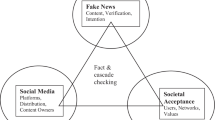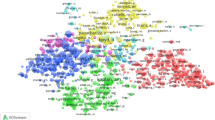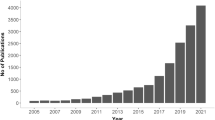Abstract
The COVID-19 pandemic, declared by the World Health Organization in March 2020, has had a significant impact on daily practices worldwide. Governments implemented various strategies such as curfews, travel restrictions, and stay-at-home directives to mitigate the risks associated with the virus. In Turkey, most educational institutions transitioned to online tools, posing challenges for university students who faced educational obstacles and social isolation from their campuses. This study explores the effects of COVID-19 on university students’ interest in politics and their consumption of political news. It relies on data collected by the Yeditepe University Global Education and Culture Research and Application Center (KEKAM) for the “University Students’ Educational and Social Adaptation during the COVID-19 in Turkey” project. In this study, we investigated how university students, a relatively highly educated group, were affected by the infodemic environment during the COVID-19 pandemic. Our analysis focused on university students’ consumption of political news, their interest in politics, and their propensity to question the reliability of news sources. We hypothesized that heightened news consumption would lead to interest in politics and greater skepticism regarding the credibility of news sources. Using a mixed-method approach that involved regression analyses and cartographic visualization, we found a positive relationship between increased news consumption and university students’ interest in politics. Additionally, students with higher levels of news consumption exhibited a greater tendency to question the reliability of news sources and information. These findings underscore the importance of critically evaluating information in an infodemic environment.

Similar content being viewed by others
Data Availability
For those who contact with corresponded author data will shared through e-mail.
References
Andı S, Aytaç SE, Çarkoğlu A (2020) Internet and social media use and political knowledge: evidence from Turkey. Mediterranean Politics 25(5):579–599. https://doi.org/10.1080/13629395.2019.1635816
Aykut S, Aykut SS (2020) Kovid-19 pandemisi ve travma sonrası stres bozukluğu temelinde sosyal hizmetin önemi. Toplumsal Politika Dergisi 1(1):56–66
Ball-Rokeach SJ (1998) A theory of media power and a theory of media use: different stories, questions, and ways of thinking. Mass Commun Soc. https://doi.org/10.1080/15205436.1998.9676398
BBC “The Vocabularist: where did the word ‘crisis’ come from?” (2015) Retrieved from: https://www.bbc.com/news/blogs-magazine-monitor-34154767.
Brennen JS, Simon FM, Howard PN, Nielsen RK. Types, sources, and claims of COVID-19 misinformation (2020). University Of Oxford. 1–13. https://doi.org/10.60625/risj-awvq-sr55
Bridgman A, Merkley E, Loewen PJ, Owen T, Ruths D, Teichmann L, Zhilin O (2020) The causes and consequences of COVID-19 misperceptions: understanding the role of news and social media. Harvard Kennedy School Misinformation Review 1(3)
Brynin M, Newton K (2003) The national press and voting turnout: British general elections of 1992 and 1997. Polit Commun 20(1):59–77
Erdoğan E, Uyan-Semerci P (2017) Understanding young citizens’ political participation in Turkey: does ‘being young’ matter? Southeast Eur Black Sea Stud 17(1):57–75
Erisen C (2022) Psychological foundations and behavioral consequences of COVID-19 conspiracy theory beliefs: the Turkish case. Int Polit Sci Rev. https://doi.org/10.1177/019251212210846
Fox S (2008) The engaged e-patient population. Pew Internet & American Life Project, Washington, DC, pp 1–4
Habitat Türkiye’de Gençlerin İyi Olma Hali Araştırması Özet Bulgular. (2020). Retrieved from https://habitatdernegi.org/blog/turkiyede-genclerin-iyi-olma-hali-arastirmasi-raporu-4-aciklandi/.
Hao X, Wen N, George C (2014) News consumption and political and civic engagement among young people. J Youth Stud 17(9):1221–1238
McLeod JM, Daily K, Guo Z, Eveland WP Jr, Bayer J, Yang S, Wang H (1996) Community integration, local media use, and democratic processes. Commun Res 23(2):179–209
Mheidly N, Fares J (2020) Leveraging media and health communication strategies to overcome the COVID-19 infodemic. J Public Health Policy 41(4):410–420
Newman N, Fletcher R, Kalogeropoulos A, Levy D, Nielsen RK (2017) Reuters institute digital news report. Reuters Institute
Nielsen R, Fletcher R, Newman N, Brennen J, Howard P (2020) Navigating the ‘infodemic’: how people in six countries access and rate news and information about coronavirus. Reuters Institute for the Study of Journalism
Ontas CO, Buz S, Hatiboglu B (2013) Youth and political participation: case in Turkey. Eur J Soc Work 16(2):249–262. https://doi.org/10.1080/13691457.2011.620567
Pakkan Ş (2021) İnfodemik dünya: sağlık habercilerinin pandemi sürecinde infodemiye ilişkin tespit ve önerileri. İletişim Kuram Ve Araştırma Dergisi 2021(55):56–79
Pakkan S, Ildas G (2021) Medyanın “pandemi” sınavı: COVID-19 salgınının Türkiye’de haber tüketim alışkanlıklarına etkisi. Turkish Studies-Social Sciences 16(1):229–247
Pasek J, Kenski K, Romer D, Jamieson KH (2006) America’s youth and community engagement: how use of mass media is related to civic activity and political awareness in 14-to 22-year-olds. Commun Res 33(3):115–135
Pian W, Chi J, Ma F (2021) The causes, impacts and countermeasures of COVID-19 “Infodemic”: a systematic review using narrative synthesis. Inf Process Manage 58(6):102713
Porat R, Tamir M, Wohl MJ, Gur T, Halperin E (2019) Motivated emotion and the rally around the flag effect: liberals are motivated to feel collective angst (like conservatives) when faced with existential threat. Cogn Emot 33(3):480–491
Righetti N, Rossi L, Marino G (2021) The 2020 research on problematic information on the COVID19 pandemic. A systematic literature review
Schraff D (2021) Political trust during the Covid-19 pandemic: rally around the flag or lockdown effects? Eur J Polit Res 60(4):1007–1017
Shah DV, Cho J, Eveland WP Jr, Kwak N (2005) Information and expression in a digital age: modeling Internet effects on civic participation. Commun Res 32(5):531–565
Stecula DA, Kuru O, Jamieson KH (2020) How trust in experts and media use affect acceptance of common anti-vaccination claims. Harvard Kennedy School Misinformation Review. 1(1)
Strömbäck J, Tsfati Y, Boomgaarden H, Damstra A, Lindgren E, Vliegenthart R, Lindholm T (2020) News media trust and its impact on media use: toward a framework for future research. Ann Int Commun Assoc 44(2):139–156. https://doi.org/10.1080/23808985.2020.1755338
Tarlakazan E, Tarlakazan BE (2021) COVID-19 pandemi sürecinin öğrenci davranışları üzerine etkisi. Eğitim Ve Toplum Araştırmaları Dergisi 8(1):52–64
Toros S, Toros E (2022) Social media use and political participation: the Turkish case. Turk Stud 23(3):450–473. https://doi.org/10.1080/14683849.2021.2023319
Türkiye İstatistik Kurumu—Turkish Statistical Institute İstatistiklerle Gençlik (Youth in Statistics) (2021). Retrieved from: https://www.tuik.gov.tr/media/announcements/istatistiklerle_genclik_2021.pdf
Ünal Y, Şencan İ, Kurbanoğlu S (2022) Gerçek Ötesi Dönemde Türkiye’deki Lisans Öğrencilerinin Haber Tüketim ve Paylaşım Davranışları. Türk Kütüphaneciliği 36(3):334–359
Vermeer S, Kruikemeier S, Trilling D, De Vreese C (2022) Using panel data to study political interest, news media trust, and news media use in the early stages of the COVID-19 pandemic. Journal Stud 23(5–6):740–760
Yanardağoğlu E (2021) ‘Just the way my generation reads the news’: news consumption habits of youth in Turkey and the UK. Global Media Commun 17(2):149–166
Yükseköğretim Bilgi Yönetimi Sistemi (2021 – 2022). Retrieved from: https://istatistik.yok.gov.tr/
Acknowledgements
We would like to thank Yeditepe University Global Education and Culture Research and Application Center (KEKAM) for providing the data used in this study and Yeditepe University Cartography Laboratory for their contributions in data visualization.
Funding
This work was supported by Yeditepe University within the scope of Yeditepe University Research Projects and Scientific Activities of Yeditepe University (YAP). Project number YAP-AP-SOB-22023.
Author information
Authors and Affiliations
Contributions
The first author collaborated with other authors designing the research project, undertook responsibilities for data collection, interpretation, and analysis of data and, contributed to writing and reviewing processes for the final version to be published. The second author made the research design, pursued data collection, contributed to the analysis tool and interpretation of data, performed the analysis and wrote the result, analysis, and conclusion parts as well as reviewed it critically for important intellectual content. The third author was fully included in the research design, data collection, regression analysis, and writing the paper. The fourth author interpreted the data for cartography, performed the analysis, created maps, and reviewed the draft paper. The fifth and final author interpreted the data, performed the analysis, and reviewed the draft critically for the final version to be published.
Corresponding author
Ethics declarations
Ethical Approval and Consent to Participate
This study has been conducted in accordance with ethical standards. The survey used in the study has received approval from the Yeditepe University Ethics Committee. Informed consent forms were provided to all participants of the survey, and the participants voluntarily participated in the study based on their own consent.
Conflict of Interest
The authors declare no competing interests.
Rights and permissions
Springer Nature or its licensor (e.g. a society or other partner) holds exclusive rights to this article under a publishing agreement with the author(s) or other rightsholder(s); author self-archiving of the accepted manuscript version of this article is solely governed by the terms of such publishing agreement and applicable law.
About this article
Cite this article
Bayındır Goularas, G., Turkan İpek, I.Z., Erözer, E. et al. Political News Monitoring and Questioning the Trustworthiness of News among Turkish University Students in the Infodemic COVID-19 Environment. JAYS 7, 83–96 (2024). https://doi.org/10.1007/s43151-024-00117-2
Received:
Revised:
Accepted:
Published:
Issue Date:
DOI: https://doi.org/10.1007/s43151-024-00117-2




